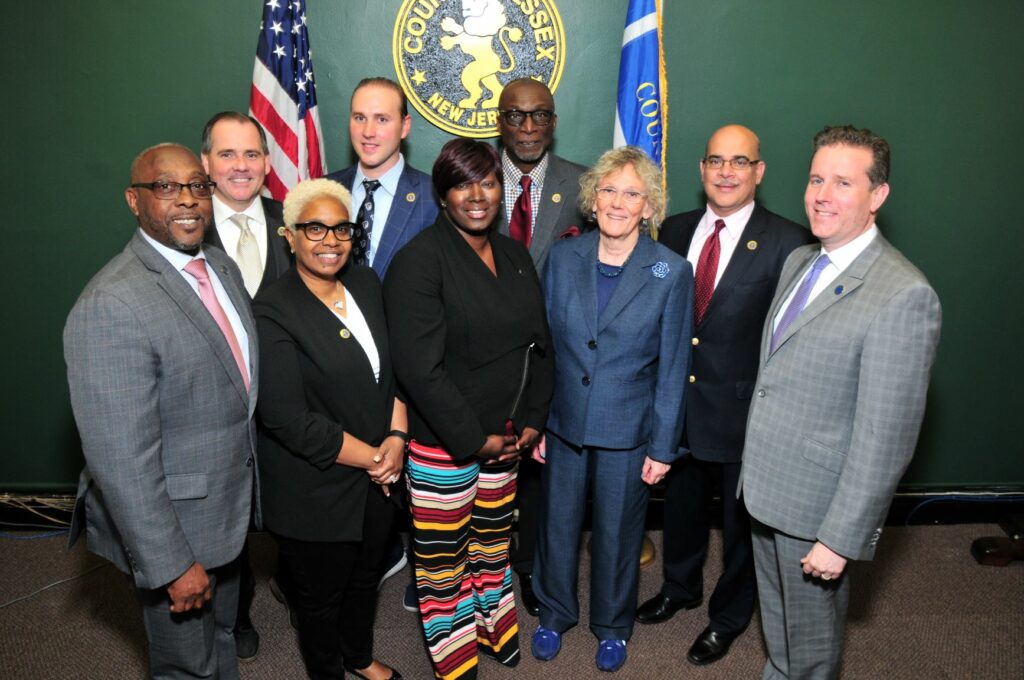ESSEX COUNTY FREEHOLDERS IN FULL SUPPORT OF OFFICIAL NAME CHANGE TO “COUNTY COMMISSIONERS”

“Pictured are (from left to right, front row) District 2 Commissioner Vice President Wayne Richardson, Commissioner At-Large Romaine Graham, District 3 Commissioner Tyshammie L. Cooper, Commissioner At-Large Patricia Sebold, and Commissioner At-Large President Brendan Gill. (From left to right, back row) District 5 Commissioner Carlos Pomares, District 4 Commissioner Leonard M. Luciano, Commissioner At-Large Rufus I. Johnson, and District 1 Commissioner Robert Mercado. PHOTO BY GLEN FRIESON”
ESSEX COUNTY FREEHOLDERS IN FULL SUPPORT OF OFFICIAL NAME CHANGE TO “COUNTY COMMISSIONERS”
(Trenton, NJ) – History was made on August 21, 2020 when Governor Phil Murphy signed into law legislative bill S855, which will require the title of “chosen freeholder” to be changed to “county commissioner”. The new law will require all “boards of chosen freeholders to be known as “boards of county commissioners” and all individual “freeholders” to be known as “commissioners”, effective January 1, 2021.
The Board of County Commissioners, formerly Board of Chosen Freeholders, is the legislative body of county government in New Jersey. The term "Freeholder" harkens to a time when only men who owned land "free" of debt were qualified to serve in the role. For all intents and purposes, this excluded every demographic of American, with the exception of white men, from serving as representatives of county government. That name will now be a part of history, as opposed to a present day title of distinction. New Jersey is known for being one of the more progressive states in the county, but prior to this new law, ironically, New Jersey was the only state in the nation still using the term.
On hand to witness the signing were former Freeholders, now County Commissioners, Vice President Wayne L. Richardson, Rufus I. Johnson, Romaine Shuler-Graham, Tyshammie L. Cooper, and a host of Government officials from different areas of the state. Commissioner Johnson, who was elected to the Freeholder Board in 2008, is the longest serving male African-American Freeholder in the history of New Jersey. To show reverence for his service, and acknowledge the significance of the name change to the African American community, he was invited on stage adjacent to Governor Murphy as he signed the bill into law. Upon the signing Commissioner Johnson stated, “For too long, the African American community has felt marginalized both politically and socio-economically. The term Freeholder, from its origin, excluded us from taking part as representatives in County government. The name change was necessary and - with the current state of affairs in our county - timely, and I am honored to be a part of this historic occasion.”
In addition to the name change, the new law requires counties to update their websites, letterheads, stationary, and other writings with the title of “county commissioners” in place of “freeholders” or “chosen freeholders” within one year of the bill’s effective date. The law will not require counties to update or replace signs to reflect the title change within this timeframe, if doing so would require the expenditure of county funds. In such a case, the law requires the changes be made whenever the writing is next updated or replaced.
Essex County Commissioner President Brendan Gill stated, “The elimination of the term Freeholder is long overdue, and I am happy the process of moving away from this term has begun.” He continued, “From a communication and technology standpoint, we cannot completely get rid of the term overnight. As a start, we have already changed the name on our social media outlets, and we will examine different ways to inform the public of the name change as we transition over the course of the next few months.”
Essex County Commissioner Vice President Wayne Richardson was also extremely supportive of the new law. “When we take the term Freeholder and put it into historical context, we are reminded of our country’s legacy of systemic exclusion and oppression. Changing the name was necessary, especially in these current times, but more necessary is the need to continue working towards fair and equal treatment for all citizens.”





